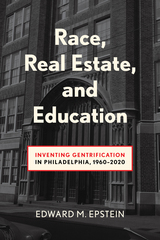6 books about Czech
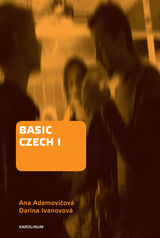
Basic Czech I
Third Revised and Updated Edition
Ana Adamovicova and Darina Ivanovova
Karolinum Press, 2009
Basic Czech I, II, and III form a complete textbook for a course for English-language speakers who want to learn Czech. The first volume presents the basics of the Czech language by means of continuous and systematic acquisition of vocabulary and conversation phrases grouped around useful topics and situations.
[more]
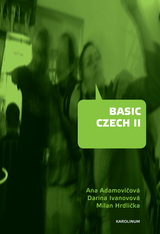
Basic Czech II
Third Revised and Updated Edition
Ana Adamovicova and Darina Ivanovova, and Milan Hrdlicka
Karolinum Press, 2014
Basic Czech I, II, and III form a complete textbook for a course for English-language speakers who want to learn Czech. Basic Czech II is structured similarly, but it moves students from beginning to intermediate work, gradually delving into more complicated issues of grammar and usage. It includes a compact disc that features audio exercises built around texts and dialogues that the student will have learned in the first volume.
[more]
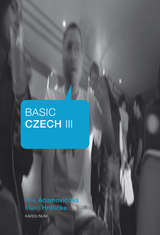
Basic Czech III
Ana Adamovicová and Milan Hrdlicka
Karolinum Press, 2016
BASIC CZECH is a modern textbook of Czech as a foreign language based on English, a sequel to Basic Czech I and Basic Czech II. It consists of six units (approx. 2000 words and phrases) and it is based on communicative and comparative approach. The textbook can be used in intensive as well as two-semester and other types of classes. It is also suitable for self-study. It provides the key to all exercises. All words and phrases are included in the Czech-English word list at the end of each unit.
The grammatical and lexical topics covered in this volume exceed the level we commonly call basic. Nevertheless to preserve the formal continuity of all three volumes, we have kept the title "Basic Czech." Grammar and vocabulary covered corresponds with level B1-B2 of the Common European Framework of Reference for Languages.
The grammatical and lexical topics covered in this volume exceed the level we commonly call basic. Nevertheless to preserve the formal continuity of all three volumes, we have kept the title "Basic Czech." Grammar and vocabulary covered corresponds with level B1-B2 of the Common European Framework of Reference for Languages.
[more]
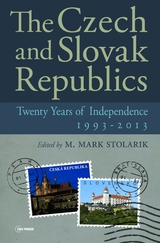
The Czech and Slovak Republics
Twenty years of Independence, 1993–2013
M. Mark Stolarik
Central European University Press, 2017
The essays in the book compare the Czech Republic and Slovakia since the breakup of Czechoslovakia in 1993. The papers deal with the causes of the divorce and discuss the political, economic and social developments in the new countries. This is the only English-language volume that presents the synoptic findings of leading Czech, Slovak, and North American scholars in the field.The authors include two former Prime Ministers of the Czech Republic and Slovakia, eight leading scholars (four Czechs and four Slovaks), and eight knowledgeable commentators from North America. The most significant new insight is that in spite of predictions by various pundits in the Western World that Czechia would flourish after the breakup and Slovakia would languish, the opposite has happened. While the Czech Republic did well in its early years, it is now languishing while Slovakia, which had a rough start, is now doing very well. Anyone interested in the history of the Czech and Slovak Republics over the last twenty years will find gratification in reading this book.
[more]
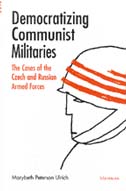
Democratizing Communist Militaries
The Cases of the Czech and Russian Armed Forces
Marybeth Peterson Ulrich
University of Michigan Press, 2000
Military support for democratically elected governments in the states emerging from communism in eastern Europe and elsewhere is critically important to the survival of the new democracies. We have seen the military overthrow civilian governments in many states in Latin America and Africa. What can be done to promote support for democratic government in transitional states?
In a groundbreaking study, Marybeth Peterson Ulrich explores the attitudes of the leaders of the armed forces in Russia and the Czech Republic toward the new democratic governments and suggests ways in which we might encourage the development of politically neutral militaries in these states. Building on the work of Samuel Huntington and others on the relationship between the military and the state, the author suggests that norms of military professionalism must change if the armies in countries making a transition from communist rule are to become strong supporters of the democratic state. The Czech Republic and Russia are interesting cases, because they have had very different experiences in the transition; they have different geopolitical goals; and they experienced different military-civilian relationships during the Soviet period. The author also explores American and NATO programs to promote democratization in these militaries and suggests changes in the programs.
Marybeth Peterson Ulrich is Associate Professor of Government, U.S. Army War College.
In a groundbreaking study, Marybeth Peterson Ulrich explores the attitudes of the leaders of the armed forces in Russia and the Czech Republic toward the new democratic governments and suggests ways in which we might encourage the development of politically neutral militaries in these states. Building on the work of Samuel Huntington and others on the relationship between the military and the state, the author suggests that norms of military professionalism must change if the armies in countries making a transition from communist rule are to become strong supporters of the democratic state. The Czech Republic and Russia are interesting cases, because they have had very different experiences in the transition; they have different geopolitical goals; and they experienced different military-civilian relationships during the Soviet period. The author also explores American and NATO programs to promote democratization in these militaries and suggests changes in the programs.
Marybeth Peterson Ulrich is Associate Professor of Government, U.S. Army War College.
[more]
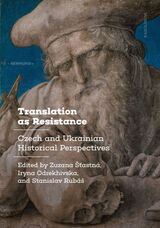
Translation as Resistance
Czech and Ukrainian Historical Perspectives
Edited by Zuzana Štastná, Iryna Odrekhivska, and Stanislav Rubáš
Karolinum Press, 2026
A groundbreaking scholarly account of translation as a form of resistance in Ukrainian and Czech history, from imperial oppression to Soviet censorship and beyond.
In cultures and communities under pressure, whether from a powerful neighbor or a hegemonic ideology, translation becomes a political act. Shaped by the constraints of the moment, both translations and their paratexts are subject to forces that compromise quality or restrict freedom of expression, even as translators seek to bring home the quality and expressive freedom of their originals. In Translation as Resistance, the role translation has played and continues to play in reframing language and power in Czech and Ukrainian cultures is presented and interrogated by Czech and Ukrainian translators.
In cultures and communities under pressure, whether from a powerful neighbor or a hegemonic ideology, translation becomes a political act. Shaped by the constraints of the moment, both translations and their paratexts are subject to forces that compromise quality or restrict freedom of expression, even as translators seek to bring home the quality and expressive freedom of their originals. In Translation as Resistance, the role translation has played and continues to play in reframing language and power in Czech and Ukrainian cultures is presented and interrogated by Czech and Ukrainian translators.
[more]
READERS
Browse our collection.
PUBLISHERS
See BiblioVault's publisher services.
STUDENT SERVICES
Files for college accessibility offices.
UChicago Accessibility Resources
home | accessibility | search | about | contact us
BiblioVault ® 2001 - 2025
The University of Chicago Press




